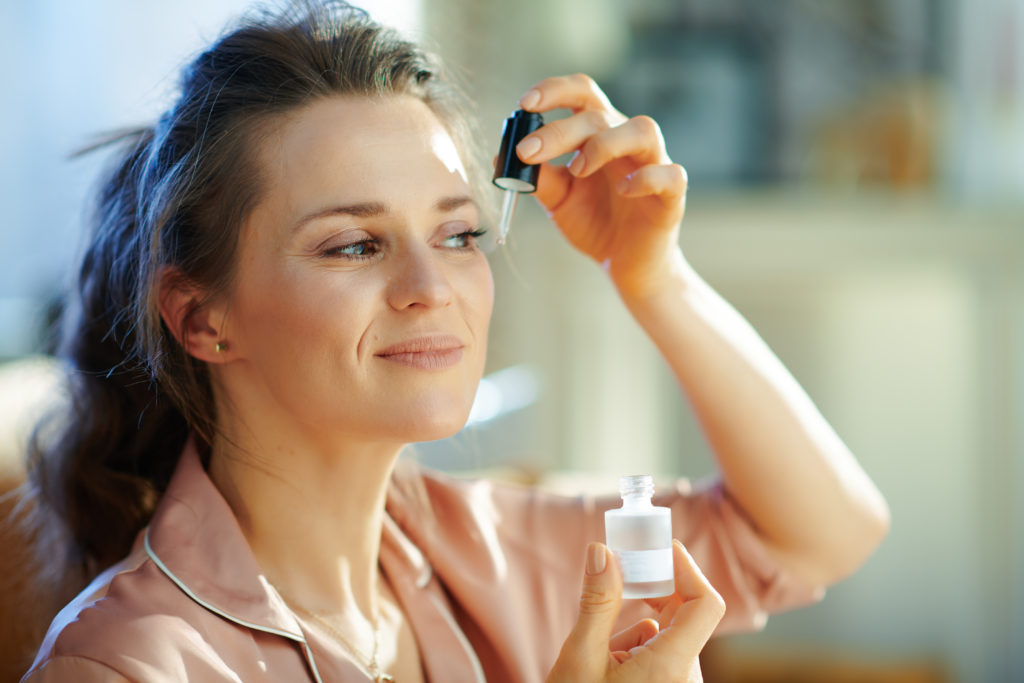Have you noticed that hyaluronic acid is everywhere lately? From moisturizers to sunscreens to sheet masks, it’s become a skincare staple—and with good reason. Hyaluronic acid is safe and effective for just about all skin types, and it has special benefits for mature skin. Let’s take a look at what makes hyaluronic acid a skincare powerhouse, how it works, and why it should be part of your daily skincare routine.
What is hyaluronic acid?
Hyaluronic acid occurs naturally in our skin. It’s a high molecular weight polysaccharide that plays a key role in the metabolism of the dermis. In fact, more than 50% of the total body content of HA is found in the skin.
HA is critical for helping skin retain moisture, as it can attach and hold large amounts of moisture. “Youthful skin”—or skin that is plump and contains elasticity—can be attributed to HA. In addition to providing essential moisture on the surface of our skin, HA has numerous internal functions as well. It plays an important role in wound healing, tissue repair, and aids in the lubrication of joints. It’s even used in certain eye surgeries and dry eye treatments.
How does hyaluronic acid work?
As a powerful humectant, topical HA can bind to over one thousand times its weight in water—so applying HA topically helps hydrate your skin. But how much hydration you get depends on the molecular size of the HA in the product you use. Large HA molecules are best at binding to water, but they can’t penetrate the skin deeply. Small HA molecules are not as good as binding to water, but they can penetrate deeper. The solution? Look for products with a wide variety of HA molecular sizes—this will give you maximum moisturization.
Is it possible to preserve the existing hyaluronic acid in my skin?
Yes—to an extent. As we age, we naturally lose key substances in our skin including collagen, elastin and hyaluronic acid. Less HA leads to a lack of volume, hydration, and general elasticity of the skin. One way to preserve your skin’s natural supply of HA—and thereby prevent premature aging—is to avoid excessive exposure to the sun. 80% of facial skin aging is caused by UV exposure, and as little as five minutes of excessive UV exposure can cause serious damage. That’s why sunscreen should be part of everyone’s daily skincare regimen, regardless of age.
What are the benefits of hyaluronic acid on mature skin?
Great news: mature skin stands to see the most benefits from HA. Our skin can change a lot as we age. Some people experience newfound sensitivity and/or redness, some have dryness, and others may get their first round of adult acne. Fortunately, HA is nonirritating and generally safe to use on any skin type. There are no known side effects of HA, either. And since it’s lightweight and easily absorbed, it works quickly to restore your skin’s natural moisture and elasticity.
Can hyaluronic acid be ingested orally?
Yes! In fact, research shows that the oral intake of HA can reduce the depth of wrinkles, improve rough skin, add elasticity, and increase overall hydration of the skin. For example, in one trial where HA was taken as an oral supplement combined with hydrolyzed collagen, vitamins, and minerals, subjects with moderate to severe photoaging noted a significant improvement in hydration, tonicity, and overall appearance. And just like topical HA, oral HA is generally well-tolerated and has no known side effects.
What about injectable hyaluronic acid?
Dermal fillers have become an increasingly popular way to inject volume directly into the skin, whether they’re used for lifting cheekbones, smoothing fine lines, or plumping up lips. Today, HA is widely used as an injectable in dermal fillers to replace lost volume.
How do you know which is right for you? Topical HA—the kind of HA that you apply directly to the surface of your skin—is intended to improve surface moisture, whereas injectables plump up and replace volume from the inside out. Topical HA is intended to moisturize, as opposed to filling or lifting sagging skin. So, if you have dry skin and you’re in need of a surface moisturizer, topical HA is for you. However, if you’re looking to fill in fine lines and/or add noticeable volume, injectable HA might be a better option. One bonus of injectable HA is that it’s reversible—if you don’t like the way it looks, your dermatologist can dissolve it within minutes.
How do I add hyaluronic acid to my skincare regimen?
These days, it’s easy to add HA to your skincare routine—in fact, you may already be using a product containing HA without even knowing it! HA comes in many forms: from serums to night creams to lip treatments, and more. Research shows that a variety of topical hyaluronic treatments are effective, from lotions to creams to serums: in addition to improving hydration by up to 96%, it can decrease wrinkle depth by up to 40%. Better yet, can opt for an oral supplement containing HA, which is also effective for suppressing wrinkles and improving overall skin tone.
Hyaluronic acid: your new favorite skincare treatment
It’s no wonder why HA is wildly popular: it’s gentle, effective, and provides a wealth of benefits for mature skin. If you’re looking to add HA to your skincare routine, be sure to check the ingredients list on any new product you want to try—many high-quality skincare products already contain it. To learn more about skin care tips for mature skin, read our post, 7 Myths About Menopause and Aging Skin.
